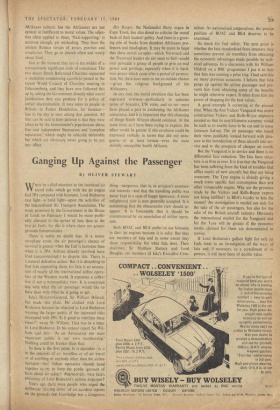bility of feeling, to find him basing that despair on
an unforgettable love. Despair in the land- scape, in the weather, in objects, in people who aren't like the only person wanted, in the ordinary routine of living; and Antonioni involves us enough to get rid of the temptation to be brisk
and chirpy. The despair of Signora senza Camelie is mitigated by a certain irony; II Grido is miti- gated by nothing, even the story and script being Antonioni's: the undiluted, central, characteristic Antonioni, at what looks like the lowest level his spirits ever fell to.
11V7TwsdaiFer9riwy 23 4035 ate of gramuta'sYNPkufweigitt Series — 6vTe-terACic
GRANADA TV
Not that ABC's capacity in this respect is any- thing like infinite. The commentator intones about Britain's plight in that summer of 1940— while the screen shows a leafless bush being blown about by a wintry wind. A small incon- gruity, of course, but all too typical. The tech- nique throughout is of the most obvious kind, counterpointing words with newsreels and a few brief specially filmed interviews, which add up to a blurred kaleidoscope of crowds and guns and ships and faces and skies, far less telling than the extracts from Churchill's own prose. These, indeed, arc the most stirring parts of the films, spoken by Richard Burton in a way which bril-
liantly echoes without impersonating the familiar cadences. (At the same time, it would surely have have been cut in from old feature movies. Nor is this a mere quibble—it raises a vital aspect of television's validity as teacher and recorder of history. The historian writing books must offer convincing sources for his facts in order to be taken seriously. By contrast, it would be far too easy for television to show, say, soldiers going into action, knowing that the viewers must accept the commentator's word that the scene was Russia, when in truth it might have been some- where else. All the more reason, therefore, that the feeling of authenticity in such films as these should be absolute. Once we recognise bits of an old movie, or an actor, we may suspect much else. ABC have only their own sloppiness to blame if we sometimes query what we see and hear, and before they start to get angry, let me insist that this is not to impugn their integrity : it is a matter of technique.
Possibly American producers worry less about this—NBC's engrossing Sit-In, shown by the BBC, about the negro rejoinder in the Deep South was needlessly marred by some obviously dramatised scenes, such as that which had a student reading a letter from home to his chums.
The other big, ambitious documentary series of late has been Mighty and Mystical (Granada), about India, which came off exceptionally well, thanks to some notable writing and photography. Less ambitious but extremely entertaining is All Our Yesterdays (Granada), in which James Cameron rummages among old newsreels; and another quite bright little quarter-hour is Johnny Morris's Sunday afternoon series Ticket to Tur- key (BBC), with commentary over silent film. Mr. Morris's note of slightly querulous wonder could do with some variation, but he can be witty, and that is rare, rare, rare in commentaries. Short programmes have the value of giving an airing to ideas and performers unable to sustain a longer show; in fact I have long thought it would be a great improvement if the quarter instead of the half-hour were accepted as the basic unit of programme time.


































 Previous page
Previous page